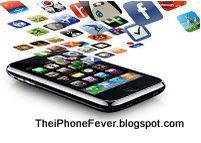 A ridiculous race is going on in the world of smartphones, with each competitor boasting about the number of available apps for his platform. Apple is talking about 200.000 apps, similar to Symbian and probably what Palm used to offer in earlier years. As a software developer and user I'm having a hard time believing the programming upsurge Apple is talking about. It is high time to debunk the app numbers craze as a high number of apps reflects the shortcomings of a platform as much as its mass market success.
A ridiculous race is going on in the world of smartphones, with each competitor boasting about the number of available apps for his platform. Apple is talking about 200.000 apps, similar to Symbian and probably what Palm used to offer in earlier years. As a software developer and user I'm having a hard time believing the programming upsurge Apple is talking about. It is high time to debunk the app numbers craze as a high number of apps reflects the shortcomings of a platform as much as its mass market success. This article mainly looks at the iPhone AppStore (and you should too), however it looks like the beginning of a trend as the situation with Android is quite similar; we'll just have to wait and see what Microsoft & WinMo are going to do.
One in six apps in the iPhone AppStore is an eBook. “Jane Eyre” alone is available through over a hundred apps. How ridiculous is this? Taking an eBook and packing it into an app? 36.000 books as individual apps?
On "older" platforms as well a on your PC or MAC you get good e-book readers, then you simply download whatever free e-book you want. Yes, no paid eBooks (no DRM) yet, but 30.000 eBooks alone from Project Gutenberg, downloadable through the default browser. However due to the well known censorship such applications usually never find their way into the AppStore (see Eucalyptus). To this you can surely add another 16.000 audiobooks since yet again a simple audiobook player would really hurt the numbers and it's easier to install and uninstall apps than to copy and delete an mp3 file... right!
On "older" platforms as well a on your PC or MAC you get good e-book readers, then you simply download whatever free e-book you want. Yes, no paid eBooks (no DRM) yet, but 30.000 eBooks alone from Project Gutenberg, downloadable through the default browser. However due to the well known censorship such applications usually never find their way into the AppStore (see Eucalyptus). To this you can surely add another 16.000 audiobooks since yet again a simple audiobook player would really hurt the numbers and it's easier to install and uninstall apps than to copy and delete an mp3 file... right!
One in six apps is a game. Some of them are absolutely fantastic, innovative and close to the PSP ones regarding graphics(control is another story) while most many others are imitations, variant 283 of Tetris or Bejeweled, crude mini-games, free, lite and full versions of the same game, and quite often Flash or old JAVA games ported and rebranded. Unfortunately in this situation independent companies and studios (eg. not EA games) have no chance of ever getting noticed or downloaded. My collection of nice 3D games sums up to roughly a dozen - heck, even a good variant of Tetris is hard to find!
Well, if you consider a platform that has:
You can surely assume most platforms out there have well over 100.000 apps - just to burst your bubble Steve;)
 The entertainment section (10% of all apps) is another show of the tragedy of the masses. Sorted by popularity, the winner is “Boobs & Thongs Lite” - Criticizing Android over decency are we Mr. Jobs? What a glorious achievement. In fact, three of the top 20 apps are about boobs, another 3 about wallpapers. Plus light sabres, farts, jokes, beer and TV.
The entertainment section (10% of all apps) is another show of the tragedy of the masses. Sorted by popularity, the winner is “Boobs & Thongs Lite” - Criticizing Android over decency are we Mr. Jobs? What a glorious achievement. In fact, three of the top 20 apps are about boobs, another 3 about wallpapers. Plus light sabres, farts, jokes, beer and TV. Education has 7% of all apps, with a few fantastic items, but also lots of superficial content, similar to simple lookup lists or a number of pages packed in an app. Some highly relevant examples of iPhone in Healthcare:
- Iphone can actually use "apps" like Epocrates! - available on all mobile platforms since... forever, now even iPhone can use it! However Epocrates recommends online usage since such an "app" becomes outdated daily. Of course this is a most fortunate example as it does index it's own content. Most medical apps for iPhone act as bookmarks, making use of an online site, or are dictionaries that simply repeat the e-book story (eg. instead of using databases and one dictionary app that interprets them you have to look separately in 10 different dictionary apps).
- Another relevant example of how useless a medical app can be is Patient Tracker. Not only do you have to write the patient status on file, but now you can torture yourself write it on the iPhone as well - and we all know what a pain typing on an iPhone can be. You think you could easily transfer the file on a PC? No, iPhone doesn't support a bluetooth or an USB connection. So unless you have your 20-pin cable, the iTunes cd and the permission of your system administrator to install music software on a hospital PC, such a program is completely useless. Just don't whine if the management says you're more interested in music than your patients ;).
- Speaking of e-books, yes the amount of repacked .pdf and .chm files that can be usually viewed on any device is surprising - yet again to boost the app numbers - unfortunately there's no discount for you if you already own the .pdf/.chm e-book.
- Color Blind Test, a magnificent app can show Green, Red and even everybody's favorite BLUE! A little more primitive than paint but "sicency" none the less ;). Sure, there's relevant content as well, just that it's very hard to come by among "medical games" and joke programs like Swine Flu Scanner Lite (Fingerprint Test).

Going into the other 50% of apps and categories in the iPhone app store, the view is the same: a few individual gems, but mostly repackaging of existing content. Each RSS feed is an app, each internet radio station is an app, each reference list is an app, each city map is an app. each document about whatever is an app. And who needs 856 weather apps?
Desperately looking for an advantage in having this many apps, I remembered the online/offline dilemma. At least having an app installed should give me more offline freedom, or not? Unfortunately not - because many apps are indeed just frontends to existing content. And if not, every single content you would want is an individual app that you need to find and download separately. In fact, instead of googling and surfing to content, in a way Apple prefers you to search in the App Store and install the one app for just this content.
What are the reasons for this mess?
- Conceptually, to hide the shortcomings of the input methods, the shortcomings of the browser and the shortcomings of the display resolution and aspect ratio (2:3 instead of standards like 16:9 or 16:10).
- Commercially, the trendiness of the iPhone and it’s mass market appeal combined with a fierce competition and freeloading on existing content. Plus Apple’s strategy of consumer lock-in.
So where is all this heading to? sooner or later, 90% of the apps will be forgotten and long dead - it will begin as soon iPhone will get a higher resolution and and better browser; Flash might accelerate this process as well. At least finally some known software companies have started to acknowledge iPhone even if it took 3 years to get the Opera mini version. I can't help to find it somehow frustrating that Nokia's N900 got the full version of Opera mobile 10 in just a few months after the release but that's that, you win some you lose some. Perhaps one day we'll have Firefox too but considering their current position on HTML5 video this is 100% not going to happen.
Speaking of other companies and application "lifetime", this is how things look for Nokia, Linux and Microsoft. Everything developed on their platforms is easy to port and bring to other operating systems. Provided you code an app for widows mobile, then you can easily bring that code to: Windows 7: Needles to say 90% out of all computers connected to the WWW run Windows.
Speaking of other companies and application "lifetime", this is how things look for Nokia, Linux and Microsoft. Everything developed on their platforms is easy to port and bring to other operating systems. Provided you code an app for widows mobile, then you can easily bring that code to: Windows 7: Needles to say 90% out of all computers connected to the WWW run Windows.
Symbian: Nokia, Samsung and Sony smartphones.
Linux: Archos, Maemo, MeeGo (and perhaps even
Android with some effort) smartphones, tablets, notebooks and laptops.
With Microsoft, Linux and Nokia you have unlimited coding freedom, whereas with the iPhone SDK, what do you have?
- The language you code in is dictated by Apple (See last part of this post for something funny).
- Cross compilation is forbidden, part of Apple's agenda against Flash (Article about Apple TV or how Apple makes you pay for what Flash users get for free coming soon).
- The iPhone SDK - useless even for Apple's own MACs not to mention the rest of OSes.
- If somehow your app exists on some other platform they go as far as forbidding you to say so.
- Multitasking via an API?! No, your multitasking app won't be approved if they don't deem it multitasking worthy (That and another 100 approval rules) this is how far control over your own work goes.
As a conclusion we can say this is a somewhat characteristic behavior for Apple - always about tying down the developer, controlling the end-user and always all about the numbers; look at the differences between 3G and 3GS, absolutely no innovations but instead they've increased the CPU clock, added more megapixels, added more RAM... and there's always stuff like the low stock they deliver for each batch of a product so they can say it's been outsold.
Is this all apple promised to you developers or to you end-users before dedicating your time and hard earned cash to them? Of course not, there's the innovative űber-powerful device part as well!
Is this all apple promised to you developers or to you end-users before dedicating your time and hard earned cash to them? Of course not, there's the innovative űber-powerful device part as well!
